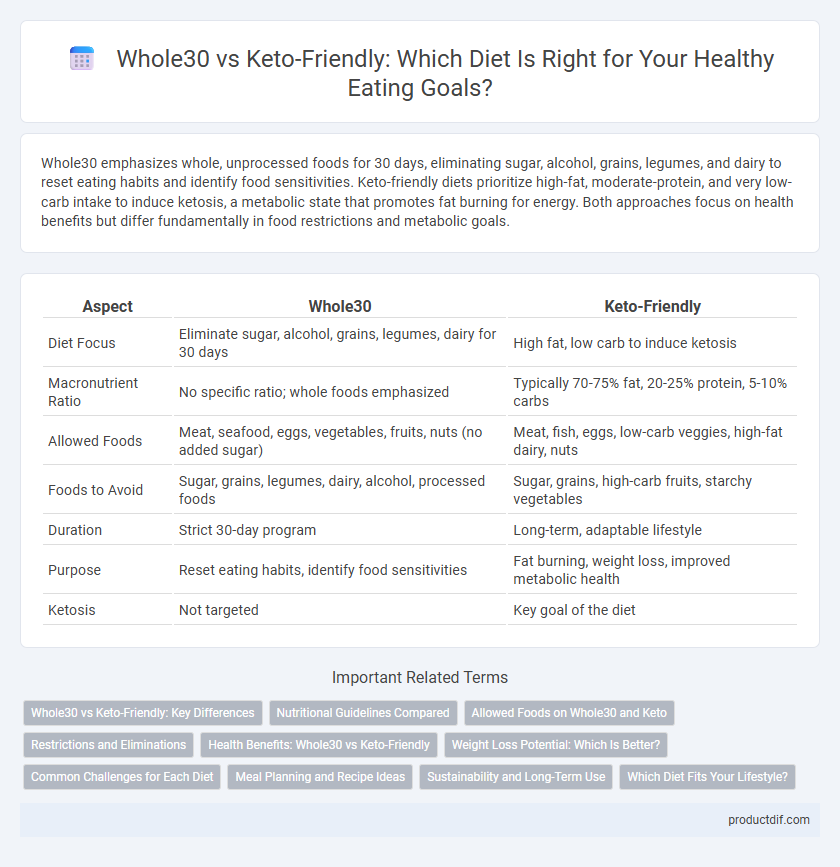Whole30 emphasizes whole, unprocessed foods for 30 days, eliminating sugar, alcohol, grains, legumes, and dairy to reset eating habits and identify food sensitivities. Keto-friendly diets prioritize high-fat, moderate-protein, and very low-carb intake to induce ketosis, a metabolic state that promotes fat burning for energy. Both approaches focus on health benefits but differ fundamentally in food restrictions and metabolic goals.
Table of Comparison
| Aspect | Whole30 | Keto-Friendly |
|---|---|---|
| Diet Focus | Eliminate sugar, alcohol, grains, legumes, dairy for 30 days | High fat, low carb to induce ketosis |
| Macronutrient Ratio | No specific ratio; whole foods emphasized | Typically 70-75% fat, 20-25% protein, 5-10% carbs |
| Allowed Foods | Meat, seafood, eggs, vegetables, fruits, nuts (no added sugar) | Meat, fish, eggs, low-carb veggies, high-fat dairy, nuts |
| Foods to Avoid | Sugar, grains, legumes, dairy, alcohol, processed foods | Sugar, grains, high-carb fruits, starchy vegetables |
| Duration | Strict 30-day program | Long-term, adaptable lifestyle |
| Purpose | Reset eating habits, identify food sensitivities | Fat burning, weight loss, improved metabolic health |
| Ketosis | Not targeted | Key goal of the diet |
Whole30 vs Keto-Friendly: Key Differences
Whole30 emphasizes whole, unprocessed foods and eliminates added sugars, grains, dairy, and legumes for 30 days to reset eating habits, focusing on real food quality and gut health. Keto-friendly diets prioritize low carbohydrate intake to induce ketosis, promoting high fat consumption and moderate protein for sustained energy and fat loss. Whole30 is more of a short-term clean eating plan, while keto is a long-term metabolic state focused on macronutrient ratios.
Nutritional Guidelines Compared
Whole30 emphasizes whole, unprocessed foods by eliminating sugar, alcohol, grains, legumes, and dairy for 30 days to reset eating habits and reduce inflammation. Keto-friendly diets prioritize high fat intake (70-75%) with moderate protein (20-25%) and very low carbohydrates (5-10%) to induce ketosis and promote fat burning. Nutritionally, Whole30 focuses on clean eating and eliminating food groups temporarily, while keto maintains strict macronutrient ratios to shift the body's energy source.
Allowed Foods on Whole30 and Keto
Whole30 emphasizes whole, unprocessed foods such as lean meats, vegetables, fruits, nuts, and seeds, strictly excluding dairy, grains, legumes, and added sugars. Keto-friendly diets prioritize high-fat, moderate-protein, and very low-carb foods like fatty fish, avocados, oils, and limited low-carb vegetables to maintain ketosis. Both diets allow vegetables and meats but differ fundamentally in carbohydrate and fat restrictions, with Whole30 focusing on food quality and Keto on macronutrient ratios.
Restrictions and Eliminations
Whole30 eliminates all added sugars, grains, dairy, legumes, and alcohol for a 30-day reset, emphasizing whole, unprocessed foods to reduce inflammation and reset eating habits. Keto-friendly diets restrict carbohydrates to typically under 20-50 grams daily, focusing on high-fat, moderate-protein intake while eliminating most sugars, grains, and starchy vegetables to induce ketosis. Both diets restrict processed foods and sugars, but Whole30 has broader eliminations including dairy and legumes, whereas Keto selectively limits carbs to maintain fat-burning metabolic state.
Health Benefits: Whole30 vs Keto-Friendly
Whole30 promotes whole, unprocessed foods to eliminate inflammation and improve gut health by resetting eating habits for 30 days, supporting long-term energy balance and reduced cravings. Keto-friendly diets focus on high-fat, low-carb intake that shifts the body into ketosis, enhancing fat burning, mental clarity, and blood sugar control. Both approaches offer distinct health benefits: Whole30 emphasizes food quality and gut reset, while keto prioritizes metabolic efficiency and weight management.
Weight Loss Potential: Which Is Better?
Whole30 emphasizes whole, unprocessed foods while eliminating sugar, grains, dairy, and legumes for 30 days, which may promote weight loss through calorie reduction and improved dietary habits. Keto-friendly diets prioritize high fat and very low carbohydrate intake, inducing ketosis that accelerates fat burning and can lead to rapid weight loss. Studies suggest keto offers faster initial weight loss, but Whole30 encourages sustainable habits that might better support long-term weight management.
Common Challenges for Each Diet
Whole30 often challenges individuals with its strict elimination of sugar, grains, legumes, and dairy, making meal planning and eating out difficult. Keto-friendly diets frequently struggle with maintaining consistent ketosis due to carb miscalculations and the high fat intake requirements, which can also cause digestive issues. Both diets demand careful attention to ingredient transparency and nutrient balance to avoid deficiencies and ensure sustained adherence.
Meal Planning and Recipe Ideas
Whole30 emphasizes whole, unprocessed foods and eliminates sugar, grains, dairy, and legumes, making meal planning centered around fresh vegetables, lean proteins, and natural fats. Keto-friendly diets require a high-fat, moderate-protein, and very low-carb intake, so recipes often include ingredients like avocado, cheese, nuts, and fatty fish to maintain ketosis. Both diets encourage creative meal planning but differ significantly in carbohydrate and fat restrictions, impacting recipe selection and nutritional balance.
Sustainability and Long-Term Use
Whole30 emphasizes whole, unprocessed foods and eliminates added sugars, grains, and dairy for 30 days, promoting short-term metabolic reset but often lacks guidance for long-term sustainability. Keto-friendly diets focus on high fat, moderate protein, and very low carbohydrate intake, offering sustained weight management benefits but can be challenging to maintain due to strict macronutrient restrictions and potential nutrient deficiencies. Both diets require careful planning to ensure nutritional balance and long-term adherence without compromising overall health.
Which Diet Fits Your Lifestyle?
Whole30 emphasizes whole, unprocessed foods and eliminates sugar, grains, dairy, and legumes for 30 days, promoting reset and mindful eating habits. Keto focuses on high-fat, moderate-protein, and very low-carb intake to induce ketosis, supporting weight loss and metabolic health. Choose Whole30 for short-term dietary clarity and habit building, or Keto for long-term fat-burning and blood sugar management aligned with low-carb lifestyle preferences.
Whole30 vs Keto-Friendly Infographic

 productdif.com
productdif.com